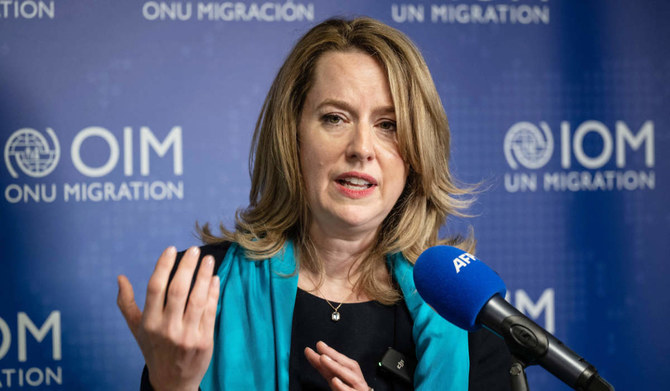GENEVA: Amy Pope of the United States elbowed aside her European boss Monday to land the top job at the International Organization for Migration, winning her bid to become the first woman to lead the UN migration agency.
Pope, 49, defeated IOM Director General Antonio Vitorino of Portugal, the European Union candidate, who swept into the post five years ago by trouncing a candidate put up by the Trump administration for a job that has long been held by Americans.
Vitorino’s prospects for a second term were clouded after Pope, with strong backing from the Biden administration, won the first round on a 98-67 vote. After a lunch break, word emerged that Vitorino had pulled out of the race.
His withdrawal paved the way for Pope to win by acclamation after member states decided to forgo what was suddenly a formality: the IOM rules requiring a two-thirds majority to win an election.
“It’s an incredible moment in time to lead the International Organization for Migration, and I could not be happier to stand before you today to start that work,” she told reporters after the closed-door voting by secret ballot and a speech to delegates afterward.
Pope and Vitorino shook hands and smiled as they arrived together for the announcement that she had won. She is expected to start her five-year term on Oct. 1, the IOM said in a statement.
The face-off was unusual in that Pope was looking to unseat her boss in a contest between allies. The United States and Portugal are fellow NATO members.
The move also caps a renewed push by the Biden administration to maintain or recoup top posts in UN institutions, including the World Food Program, children’s agency UNICEF, and the International Telecommunications Union, in recent months — after the Trump administration largely shunned several Geneva institutions.
“Ms. Pope’s election reflects a broad endorsement by member states of her vision to keep people at the heart of IOM’s mission, while implementing key governance and budget reforms to ensure IOM is prepared to meet the challenges it faces,” US Secretary of State Antony Blinken said in a statement.
Eight of the agency’s 10 directors general since the International Organization for Migration was founded 72 years ago have been American. The organization has nearly 19,000 staff members working in 171 countries to promote “humane and orderly” migration.
“The situation at the southern border of the United States underscores why it’s so critical that we approach migration from a much more comprehensive point of view,” Pope said. “Many of those migrants have gone through extraordinary circumstances to end up at the border.”
Its job in many of its 560 field offices is to provide migrants with food, water, shelter and help with government-imposed paperwork. The agency also collects and shares vast amounts of data about flows of people to governments, and advises them on policy decisions.
Vitorino won praise for boosting the budget and staff at IOM, helping to hire and promote more women into top positions, and reaching out to developing countries, supporters said.
Vitorino, 66, is a former European Union commissioner for Home and Justice Affairs and think-tank chief who cut his teeth in politics as a Portuguese Socialist, much like UN Secretary-General Antonio Guterres.
Pope, a former prosecutor, served as migration adviser to President Joe Biden early in his administration and recently was Vitorino’s deputy for reform and management.
The US and the EU are both major funders of IOM facing challenges with mass migration. Critics fault the EU for failing to do more to prevent migrants from taking often-deadly boat trips across the Mediterranean Sea from North Africa to Europe.
Geneva-based UNHCR, the UN refugee agency — which has some overlap with what IOM does — and others have expressed concern about how changes to US migration law will affect people trying to cross the US-Mexico border.
Pope is likely to face extra scrutiny in whether she speaks out against any perceived missteps in Biden’s migration policy, and she alluded to the difficulties faced by migrants who trek across central America to reach the United States.
“As the director-general for the International Organization for Migration, I’m not working for the United States government,” she said. “So my view is that it is important that we as an organization call out practices, no matter who they’re coming from, and acknowledge whether they work or they don’t work.”
IOM, which counts 175 member countries, is responding to mass migration crises in places as diverse as Bangladesh, Ukraine, Sudan and South American nations that neighbor Venezuela.

























